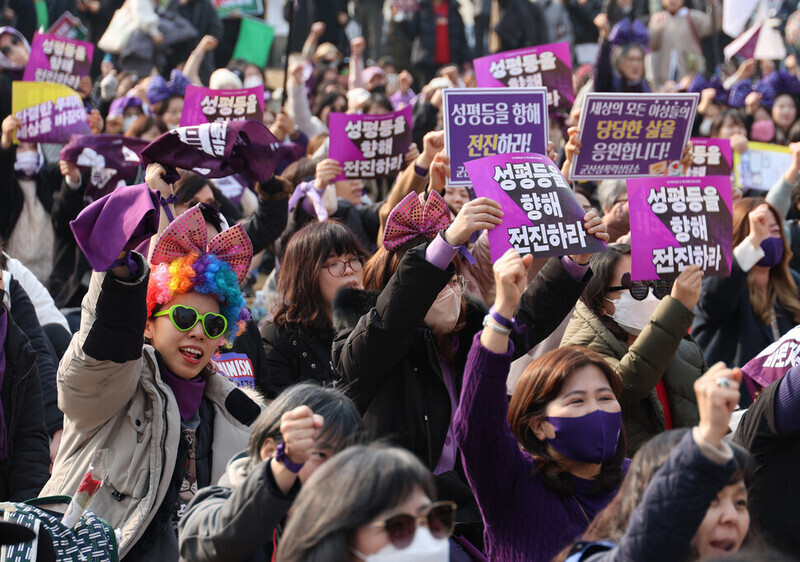hankyoreh
Links to other country sites 다른 나라 사이트 링크
[Column] What’s happening to Korea’s young men?


By Park Kwon-il, independent researcher and author of “Korean Meritocracy”
A fascinating article was published in the Financial Times last month. Its focus was on the widening gap in ideology between young women and men around the world.
In every country, young people tend to lean progressive, turning more conservative as they get older. But what the article found was that young people in many countries are trending more conservative, resulting in a wider gender gap in attitudes.
Examples were cited from the US, the UK, Germany, and South Korea — the last of which was especially unusual. In other countries, young men were becoming more conservative, but only relative to women. They still leaned more progressive than conservative overall.
South Korea was different. The graph showed a plunge in attitudes among young South Korean men beginning sometime around 2015. The conservative shift has been both extreme and swift.
How did this situation come to pass? Unfortunately, the article only highlighted the phenomenon without presenting any specific analysis of its background or causes.
In terms of an explanation, a few words do come to mind, and one of them is “loneliness.”
In “The Attack of Loneliness,” political philosopher Kim Man-kwon emphasizes that 20-somethings are the “loneliest generation in an era of loneliness.” He persuasively argues that loneliness is not some purely personal or romantic emotion, but a serious social phenomenon that leads to suffering, hatred and even death.
Emphasizing that loneliness is not an issue for individuals alone, the book comments that it has “reached a stage where it is actually threatening democracy.” It quotes the ideas of Hannah Arendt as it warns that “totalitarianism is sustained by the support of lonely masses.”
At this point, a certain question arises. Young women are no exception to this “attack of loneliness.” So why have they become more progressive as their male counterparts have become more conservative?
While the situation can’t be reduced to any one factor, there does appear to be at least one key difference between young women and men. As the Financial Times article notes, the inflection point in terms of the philosophical divide becoming more pronounced came in the year 2015. This was a time when a new feminist wave was emerging in the wake of the #MeToo movement and a misogynistically motivated murder at Seoul’s Gangnam Station.
But to present feminism as the sole answer is to explain things in two-dimensional terms. It’s also important to consider how exactly it has operated.
Since it is impossible to give a full explanation in the space of a brief column, I can only offer an oversimplified summary. In short, young men have remained caught in a victimhood narrative, while young women have progressed into a solidarity narrative.
A number of women have resisted being confined to a victimhood identity, working instead toward actively aligning with and looking after other women. The result has been an unprecedented number of new political associations and caregiving communities.
In contrast, young South Korean men have emphasized their own victimhood as people obliged to complete military service, focusing their attacks on groups they see as “free riders” benefiting from community resources.
Obviously, the fact that South Korea remains an androcentric society means they may not have perceived the need for any newfound solidarity. The over-internalization of online community rules barring “socializing behavior” — known in Korean as “chinmokjil” — has also prevented young men from establishing even the most rudimentary forms of solidarity.
The key factor is that the decision on whether to remain bound to a victimhood narrative or progress to a solidarity narrative is based on the existence of a larger cause. In the case of women, the groundwork for feminism was already laid, allowing them to achieve solidarity through a greater sense of commonality in spite of conflicts and differences.
Young men, in contrast, have not had the same sort of cause. An ability-based belief system might be mentioned here, but as many experts have already shown, such attitudes not only are unjustified in theoretical and moral terms but also exhibit a self-defeating logic that excludes males who do not conform to the “alpha” ideal.
Over the past few years, young South Korean women have been fighting a fierce battle for recognition under the feminist banner. Institutional and cultural achievements have been realized, although they remain inadequate.
In contrast, younger males have only collectively entrenched the sort of image associated with the alt-right website known as Ilbe Storehouse. To be sure, a portion of them are actual dyed-in-the-wool members of the far right and bigots. Even the highest estimates, however, put that proportion at only around 20%–30%.
Various statistics from recent years show that young men are more divided than any other group. Indeed, the differences that exist among young men may be even more profound than the ones that exist between young women and young men.
We live in an era where it is difficult for people to find common values within any larger cause or narrative. It’s a situation of “worldlessness,” where it becomes impossible to identify one’s place in the place or a direction forward.
For members of younger generations, this can be a force pushing them to declare identities or a source of chronic worries about recognition. This is why it is necessary to take a closer look and start a conversation rather than simply lumping people together as monsters.
Please direct questions or comments to [english@hani.co.kr]

Editorial・opinion
![[Column] Season 2 of special prosecutor probe may be coming to Korea soon [Column] Season 2 of special prosecutor probe may be coming to Korea soon](https://flexible.img.hani.co.kr/flexible/normal/500/300/imgdb/original/2024/0426/3317141030699447.jpg) [Column] Season 2 of special prosecutor probe may be coming to Korea soon
[Column] Season 2 of special prosecutor probe may be coming to Korea soon![[Column] Park Geun-hye déjà vu in Yoon Suk-yeol [Column] Park Geun-hye déjà vu in Yoon Suk-yeol](https://flexible.img.hani.co.kr/flexible/normal/500/300/imgdb/original/2024/0424/651713945113788.jpg) [Column] Park Geun-hye déjà vu in Yoon Suk-yeol
[Column] Park Geun-hye déjà vu in Yoon Suk-yeol- [Editorial] New weight of N. Korea’s nuclear threats makes dialogue all the more urgent
- [Guest essay] The real reason Korea’s new right wants to dub Rhee a founding father
- [Column] ‘Choson’: Is it time we start referring to N. Korea in its own terms?
- [Editorial] Japan’s rewriting of history with Korea has gone too far
- [Column] The president’s questionable capacity for dialogue
- [Column] Are chaebol firms just pizza pies for families to divvy up as they please?
- [Column] Has Korea, too, crossed the Rubicon on China?
- [Correspondent’s column] In Japan’s alliance with US, echoes of its past alliances with UK
Most viewed articles
- 1‘We must say no’: Seoul defense chief on Korean, USFK involvement in hypothetical Taiwan crisis
- 2Is Japan about to snatch control of Line messenger from Korea’s Naver?
- 3Division commander ordered troops to enter raging flood waters before Marine died, survivor says
- 4[Editorial] Korea’s surprise Q1 growth requires objective assessment, not blind fanfare
- 5[Column] Season 2 of special prosecutor probe may be coming to Korea soon
- 6[Special report- Part III] Curses, verbal abuse, and impossible quotas
- 7Flying “new right” flag, Korea’s Yoon Suk-yeol charges toward ideological rule
- 8[Guest essay] The real reason Korea’s new right wants to dub Rhee a founding father
- 9[Column] ‘Choson’: Is it time we start referring to N. Korea in its own terms?
- 10[Column] Park Geun-hye déjà vu in Yoon Suk-yeol